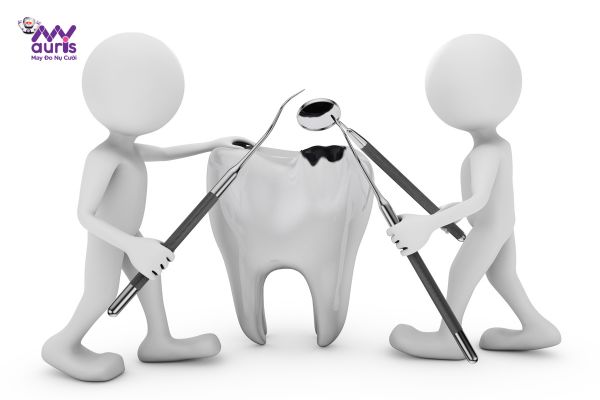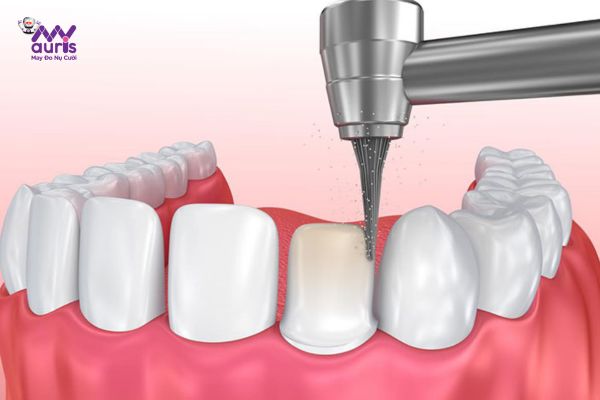Some defects on teeth such as dull, yellow, broken, chipped, cavities, etc. teeth all make us less confident, because of the loss of aesthetics. Therefore, making porcelain teeth is a solution to restore the shape and color of teeth and upgrade the smile to a more perfect one. However, there are quite a few tips and warnings about porcelain crowns being bad for your teeth. So there are quite a few customers wondering whether to get porcelain teeth or not. Let’s find out with My Auris through the following article.
Why do you have to make porcelain teeth?
Porcelain teeth are also known as porcelain crowns that are crafted according to the parameters of real teeth. Therefore, porcelain crowns have the same color, shape, and size as real teeth. After being restored to real teeth, porcelain crowns perform the function of chewing, expressing aesthetics and performing activities and functions like real teeth.
The choice to make porcelain teeth for teeth most often comes from wanting to increase aesthetics, wanting to change the appearance of teeth to make them more even and bright white. From there, show a more confident and perfect smile in front of the crowd.

For the rest, choose to make porcelain teeth with the purpose of protecting real teeth, preventing pathogens and harmful agents such as bacteria and plaque. attack and overcome defects and blemishes on teeth. Furthermore, it helps to adjust the bite of the teeth more accurately, ensuring the ability to chew and pronounce.
Should or should you not get porcelain teeth?
Should or should you get porcelain teeth is something that many people wonder about. Making porcelain teeth, as well as other methods, has its own advantages and disadvantages. Therefore, depending on the condition of the teeth and needs, people decide whether to do it or not.
Furthermore, to determine whether or not you should have porcelain teeth, you should first see a specialist for an examination and general oral health check. From there, the doctor will advise and recommend a suitable treatment plan as well as answer whether you should have porcelain or not for your condition.
Advantages of porcelain teeth
- High aesthetics: not everyone has straight, bright white teeth, so making porcelain teeth is a solution to help teeth restore their shape and color. Porcelain crowns have the same color as real teeth and are crafted according to personal specifications, ensuring high aesthetics and making it difficult to recognize fake teeth.
- Good chewing ability: when making porcelain teeth, the doctor will grind the teeth and straighten them.Fill your teeth to balance your bite. Moreover, strong porcelain teeth help you chew more comfortably.
- Pronunciation ability: teeth are fitted evenly and closely together, not only providing aesthetic beauty but also overcoming poor pronunciation due to gapped teeth.
- Protects real teeth: porcelain crowns cover the base of real teeth like a protective shell, preventing bacteria, plaque, and food debris from attacking. From there, prevent tooth decay as well as other diseases.

Disadvantages of porcelain teeth
The biggest disadvantage of This method is tooth grinding, which is a mandatory step when making porcelain. This is also something that people worry and wonder about a lot about should or should they get porcelain teeth. Tooth grinding helps create a standard tooth base to fit the porcelain crown tightly onto the tooth base. This is an invasion of real tooth tissue.
However, if performed at a reputable dental facility, ensuring solid workmanship, high expertise, rich experience from doctors, and modern supporting equipment and machinery, tooth grinding will not affect oral health. And the process of making porcelain teeth goes smoothly, quickly, safely and successfully.
On the contrary, if you choose poor quality dental facilities, unsteady and inexperienced doctors can grind teeth invasively and substandardly, leading to sensitive teeth, pain, and prolonged sensitivity. Furthermore, it also causes many other consequences for teeth, affecting the pulp and even permanent tooth loss.
When you should and should not get porcelain teeth
As mentioned, whether or not you should get porcelain teeth depends on each person’s condition and oral health. Here are some cases where you should and should not have porcelain teeth that everyone should consider:
In cases where you should have porcelain teeth
There are quite a few cases where teeth have diseases or defects that need to be restored. The new porcelain shape brings aesthetics and restores the ability to chew well:
Tooth decay
Slight tooth decay, small cavities can be filled to prevent further decay. However, in cases of severe decay, dental fillings are not effective. At this time, the doctor will treat the decay and make porcelain teeth to protect the real tooth pulp. If tooth decay is not treated and made porcelain, the disease will spread and affect all teeth in the jaw.

Teeth with bad shape
Congenital teeth that are too small, unbalanced in shape, or caused by an accident broken, no longer intact. All these things make teeth look bad and have defects. Choosing porcelain teeth helps restore tooth shape, helping the teeth become even and balanced on the jaw.
Mild buck teeth, buck teeth
Buck teeth, buck teeth not caused by the jaw bone is a condition where the teeth grow in the wrong bite, affecting both aesthetics and chewing. If the severity is mild, buck teeth can be ground down and adjusted to be covered with porcelain to improve aesthetics and correct defects without the need for braces.
Spreaded teeth
Spreaded teeth is a condition in which teeth grow at different distances on the jaw. If the gap is small or medium, you can choose porcelain teeth instead of braces to improve aesthetics, chewing and pronunciation.
Damaged teeth, teeth that have had root canal treatment
Damaged teeth, or teeth that have been removed and treated with root canals, will become brittle and break easily. Making porcelain teeth is a way to create a protective “coat” for real teeth, limiting permanent tooth loss.
Irregular teeth
If teeth are uneven or slightly misaligned, you can also choose porcelain teeth to help make your teeth more even and balanced on the jaw.
Yellow, stained teeth
Teeth that are yellow, contaminated with food coloring or contaminated with tetracycline due to using too many antibiotics and cannot be whitened by conventional methods, porcelain teeth will help to enhance the color and make the teeth brighter and whiter.

In cases where dental work should not be done Porcelain
Perhaps everyone knows that porcelain teeth will require tooth grinding, so there are some cases where it should not be done:
- Weak teeth etcà shaky
- Teeth too sensitive
- Severely misaligned teeth due to jaw bone
- Teeth with severe disease: tooth decay, gingivitis, periodontitis, severe infection,…

Hopefully the shares in the article about should or should not make porcelain teeth help everyone Get your own answers. To determine whether your condition is suitable for porcelain teeth, see a qualified doctor to get the most appropriate plan and advice. Please contact My Auris Dental immediately for advice and to schedule an examination as soon as possible.
Anh Thy





